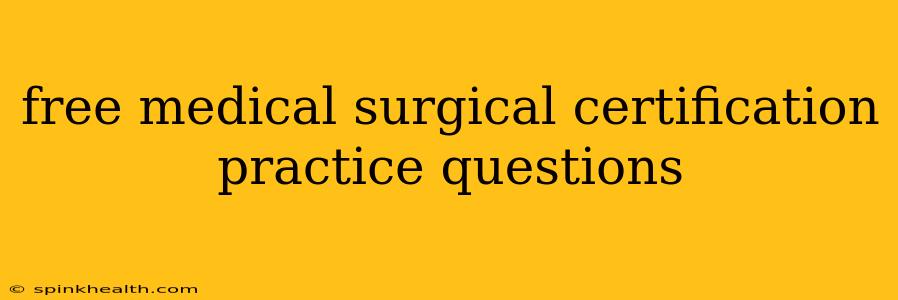So, you're gearing up for your medical-surgical certification exam? The butterflies are fluttering, the textbooks are stacked high, and the pressure is on. It's a challenging exam, no doubt, but with the right preparation, you can conquer it! This isn't just another blog post; it's your roadmap to success. We'll dive into free practice questions, address common concerns, and provide expert insights to boost your confidence and knowledge.
Let's begin our journey by tackling some crucial areas, using a story-telling approach to make learning more engaging and memorable.
Imagine you're on your first day in a bustling hospital ward. The energy is electric, the patients diverse, and the challenges...well, let's just say they're varied. Each patient presents a unique puzzle, requiring quick thinking, critical analysis, and a deep understanding of medical-surgical principles. That's precisely what your certification exam tests – your ability to handle the complexities of this demanding field.
Sample Medical-Surgical Certification Practice Questions
Let's jump right in with a few sample questions to get you thinking:
Question 1: A patient post-op from abdominal surgery exhibits sudden shortness of breath and chest pain. What is your immediate priority?
A) Administer pain medication. B) Check vital signs and assess respiratory status. C) Call the physician. D) Prepare for discharge.
Answer: B) Check vital signs and assess respiratory status. This is the most crucial first step in any emergency situation.
Question 2: You're caring for a patient with a new diagnosis of type 2 diabetes. Which teaching point is most important to emphasize regarding foot care?
A) Avoid wearing socks. B) Apply lotion between the toes daily. C) Inspect feet daily for any sores or wounds. D) Use hot water to soak the feet.
Answer: C) Inspect feet daily for any sores or wounds. Diabetic neuropathy can lead to undetected wounds, increasing the risk of infection.
Question 3: A patient is receiving intravenous antibiotics. What is a critical nursing intervention to prevent complications?
A) Administer the medication as quickly as possible. B) Monitor for infusion site reactions. C) Only assess the patient's vital signs before administering the medication. D) There are no critical interventions for this type of medication.
Answer: B) Monitor for infusion site reactions. Infusion reactions, such as phlebitis, are common side effects.
These are just a few examples to get you started. Remember, consistent practice is key! Many online resources offer free practice questions and quizzes.
How to Find More Free Medical-Surgical Certification Practice Questions
This is where your online search skills come in handy! Many websites offer free practice questions and quizzes. Search for terms like "free medical-surgical NCLEX practice questions," "free medical-surgical certification review," or "medical-surgical nursing practice exams." Remember to be discerning about the source; ensure the questions are relevant to the specific certification you're pursuing.
What are the most common topics covered in the medical-surgical certification exam?
The exam covers a broad range of topics, but some recurrent themes include:
- Assessment and Monitoring: Vital signs, pain assessment, wound care, and I&O monitoring. This is the foundation – getting a clear picture of the patient's status. Think of it as the detective work before you can solve the case.
- Medication Administration: Understanding drug actions, interactions, and potential side effects. This involves mastering the pharmacology involved.
- Infection Control: Preventing and managing infections through proper hygiene, isolation precautions, and sterile techniques. A critical skill in preventing hospital-acquired infections.
- Surgical Procedures: Pre-op, intra-op, and post-op care, including wound management and complications. This covers the whole surgical journey.
- Chronic Diseases: Managing patients with conditions like diabetes, heart failure, and COPD. This involves knowing the complexities of managing these long-term conditions.
How long should I study for the medical-surgical certification exam?
The ideal study time varies depending on your prior knowledge and learning style. However, many professionals recommend a dedicated study plan of several weeks or even months. A well-structured study plan will include regular practice sessions to build and maintain your knowledge and confidence.
What resources are available to help me study for the medical-surgical certification exam?
Numerous resources can support your preparation, from textbooks and online courses to practice exams and study groups. Take advantage of all available resources to maximize your understanding.
Remember, this journey to certification isn't a sprint; it's a marathon. Consistent practice, a well-structured study plan, and a positive mindset are your keys to success. Good luck!

